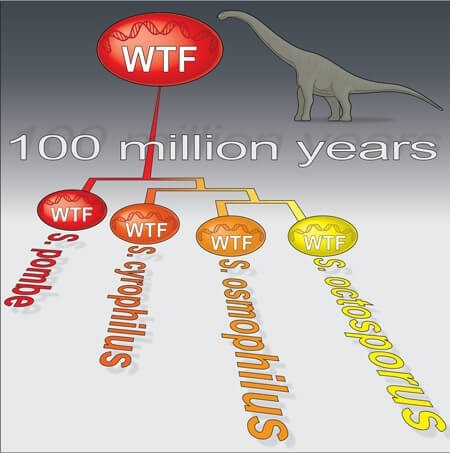Meiotic drivers, which are a sort of selfish gene, are, in fact, selfish. They are found in nearly all species’ genomes, including humans, and unfairly convey their genetic information to more than half of their offspring, resulting in infertility and impaired organism health. Their longevity during the evolutionary time was thought to be brief due to their parasitic ability, until recently.
 Three unique fission yeast species, S. octosporus, S. osmophilus, and S. cryophilus diverged from S. pombe over 100 million years ago, with each species containing wtf genes. Image Credit: Stowers Institute for Medical Research.
Three unique fission yeast species, S. octosporus, S. osmophilus, and S. cryophilus diverged from S. pombe over 100 million years ago, with each species containing wtf genes. Image Credit: Stowers Institute for Medical Research.
The Stowers Institute for Medical Research, in partnership with the National Institute for Biological Sciences in Beijing, China, has discovered a selfish gene family that has survived for over 100 million years—ten times longer than any other meiotic driver ever identified—calling into question long-held beliefs about how natural selection and evolution deal with these threatening sequences.
The thinking has always been that because these genes are so nasty, they won’t stick around in populations for very long. We just found out, that isn’t true, that the genomes simply can’t always get rid of them.”
SaraH Zanders PhD, Associate Investigator, Stowers Institute for Medical Research
Meiotic drivers are so called because they can actually “drive” the transmission of their genes across a genome, frequently with deleterious repercussions. Natural selection is thus the principal factor opposing selfish genes, preferring genetic variants that eliminate the desire for a species’ recovery of fertility and overall health.
Natural selection has a limited ability to remove meiotic drivers from a population. Imagine holding soccer team tryouts (natural selection) to recruit the best players (genes that promote fitness). Drivers are players that sabotage the other players trying out. Drivers make the team, but not because they are good at soccer.”
SaraH Zanders PhD, Associate Investigator, Stowers Institute for Medical Research
Recent research guided by scientist Mickael De Carvalho, PhD, from the Zanders Lab, and Guo-Song Jia, a predoctoral researcher in the lab of Li-Lin Du, PhD, recognized for the first time that a family of selfish genes called wtf have not only prospered in the fission yeast, Schizosaccharomyces pombe, but have been transferred on to three unique yeast species that diverged from S. pombe around 119 million years ago.
The study was published on October 13th, 2022, in the eLife journal.
“This finding is particularly novel as a family of drive genes have thrived at least ten times longer than what geneticists ever believed possible,” stated Zanders.
At the time of meiosis, the specialized cell division that produces reproductive cells such as sperm and eggs, the inheritance of genetic material from each parent’s pair of chromosomes is 50/50, or equally probable for each reproductive cell.
In truth, yeast meiotic drivers are a more powerful genetic parasite. The wtf gene family are killer meiotic drivers because they not only pass the selfish gene to more than 50% of their offspring but also kill any reproductive cells (or yeast spores) that do not inherit the drive gene.
Natural selection favors genes that repress, or silence, drive, making it useless, often saving a species from selfish genes. The rapid rates of mutation in the wtf gene family are partly responsible for how they avoided suppression.
The notion of how a species can survive the anticipated rise in infertility, which usually results in extinction, is altered by its persistence. Additionally, it alters how researchers may find and categorize selfish gene families in other species, including humans.
Until now, when looking for candidate drivers within a genome, I wouldn’t have considered ‘old’ genes as a possibility. Since selfish genes are major drivers of evolution, this new finding opens the door for thinking about how drivers can have persistent, long-term effects on genome evolution.”
SaraH Zanders PhD, Associate Investigator, Stowers Institute for Medical Research
Discovery of 119-million-year-old Selfish Genes in Yeast
New research from the Zanders Lab, published in eLife, has uncovered a selfish gene family that has survived for over 100 million years – casting new doubt on established beliefs on how natural selection and evolution tackle these threatening sequences. Video Credit: Stowers Institute for Medical Research.
Source:
Journal reference:
De Carvalho, M., et al. (2022) The wtf meiotic driver gene family has unexpectedly persisted for over 100 million years. eLife. doi.org/10.7554/eLife.81149.